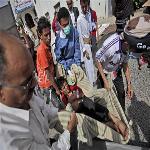March 12, 2011

Photo: AP
Anti-government protesters carry an injured an injured person into the yard of a Mosque for help following clashes with Yemeni police in Sana'a, Yemen, March 12, 2011
Government security forces stormed a protest camp in the Yemeni capital Sana'a early Saturday. Protesters say at least one person was killed and at least 300 injured. At least two more people were reported killed during protests elsewhere in the capital and across Yemen on Saturday and dozens more were reported injured.
Anti-government protesters shouted, jeered and ran for cover after government security forces attacked their protest camp Saturday close to Sana'a University. The attack, which took place during dawn prayers, caught the mostly young protesters off-guard.
Eyewitnesses said that police used live ammunition to try and disperse the crowd, along with tear-gas and batons. The protesters threw rocks and bottles at police to try and stop their advance.
Arab satellite channels showed dozens of young anti-government protesters being carried away on stretchers, some with blood pouring from their faces. Others appear to have passed out and lay sprawled on the ground. Doctors also reported treating numerous victims of gas-inhalation.
Stephen Steinbeiser of the American Institute for Yemeni Studies in Sana'a says that the attack on the anti-government protesters is causing a backlash among the public and that activity appears to have ground to a halt in many places.
"Protests are growing and people are very angry about the raids on the anti-government protesters," he said. "People are very upset by that and it seems to have emboldened and galvanized a lot of the protesters themselves and there seems to be a gathering momentum on a more formal level."
"Public workers did not report to work today [Saturday], private sector workers a lot did not report to work either. The interruptions in Sana'a itself are getting a bit more intrusive. More roads are being blocked off and so it's actually getting a little bit difficult to get around in certain areas and no one is really quite sure what to expect," he added.
Steinbeiser adds that the government of long-time President Ali Abdullah Saleh appears to be in a difficult position now and that finding a quick solution to the crisis will not be easy:
"The problem is that there is not a good solution and the president has, I think, offered more concessions in the past month than he has in the past 32 years. So, I think that presents a large problem to the Yemeni government about how to change quickly and effectively to please people. But, the protests are growing in all of the cities, in Mukalla and Hadramout, in Hodeida, in Aden," he said.
Jazeera TV also reported clashes between protesters and police in the city of Taiz, in addition to the southern port city of Aden and in Hadramout.
The attack on the anti-government protest camp comes two days after President Saleh offered a vast series of political reforms to opposition political leaders and to the protesters. The protest movement is demanding that Mr. Saleh, who has ruled the country since 1978, resign.